Unit 3 Online tours Grammar课件(共26张PPT)牛津译林版八年级下册
文档属性
| 名称 | Unit 3 Online tours Grammar课件(共26张PPT)牛津译林版八年级下册 | 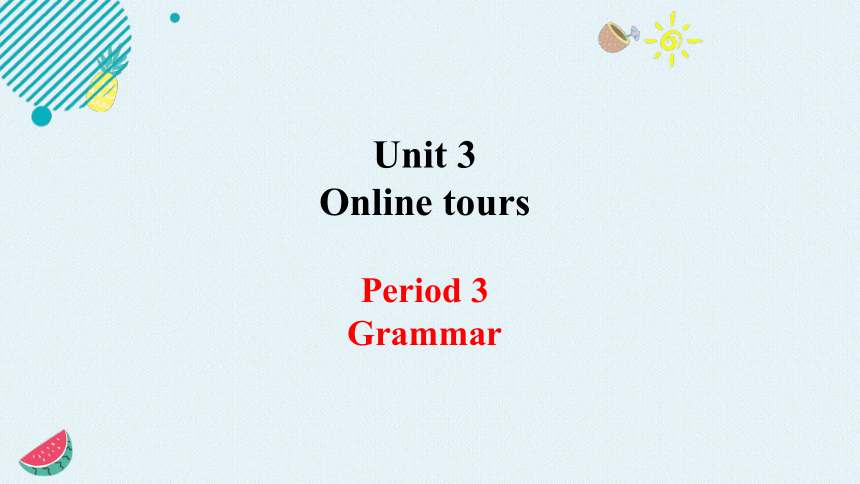 | |
| 格式 | pptx | ||
| 文件大小 | 1.5MB | ||
| 资源类型 | 教案 | ||
| 版本资源 | 牛津译林版 | ||
| 科目 | 英语 | ||
| 更新时间 | 2025-02-06 14:02:42 | ||
图片预览


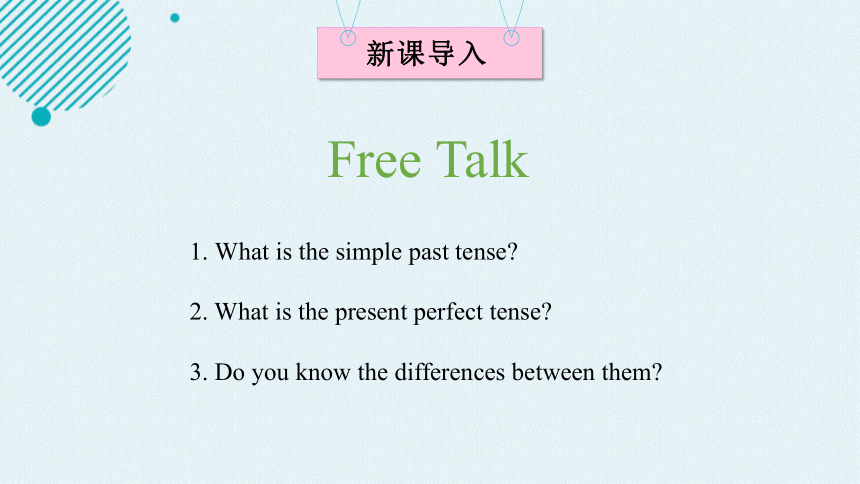
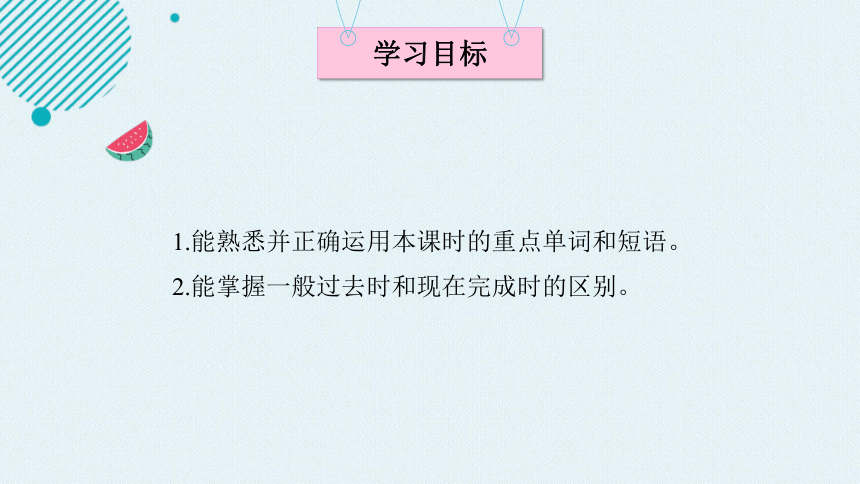
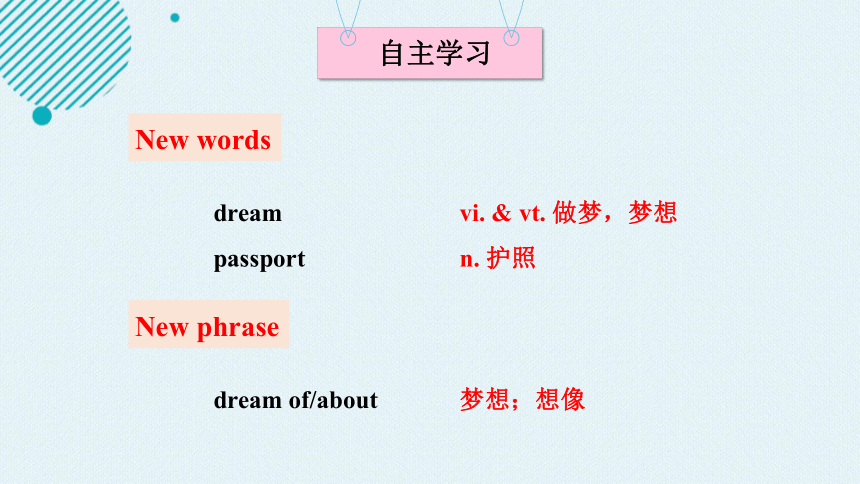
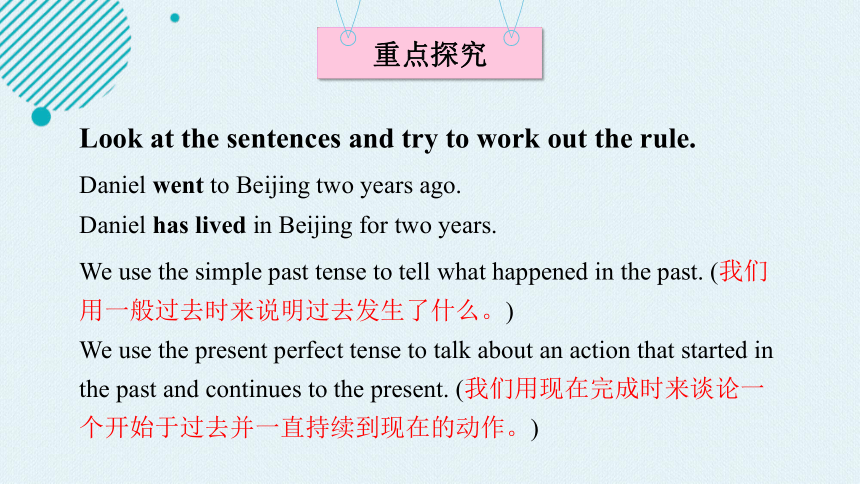
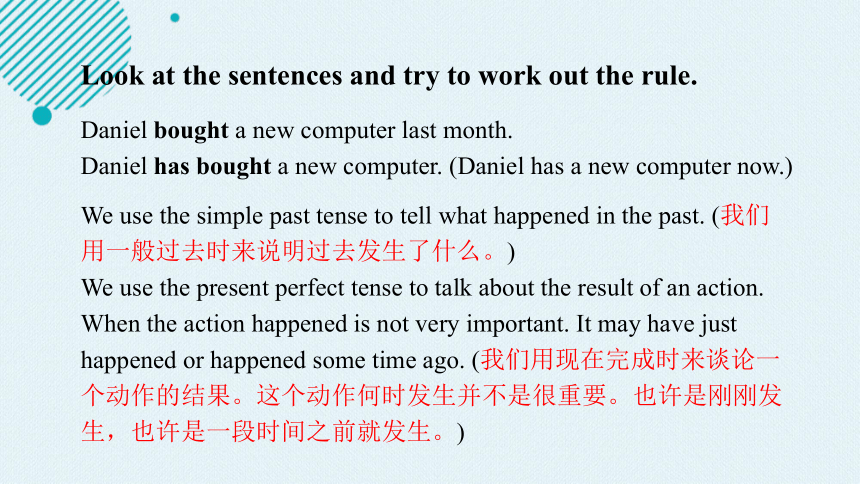
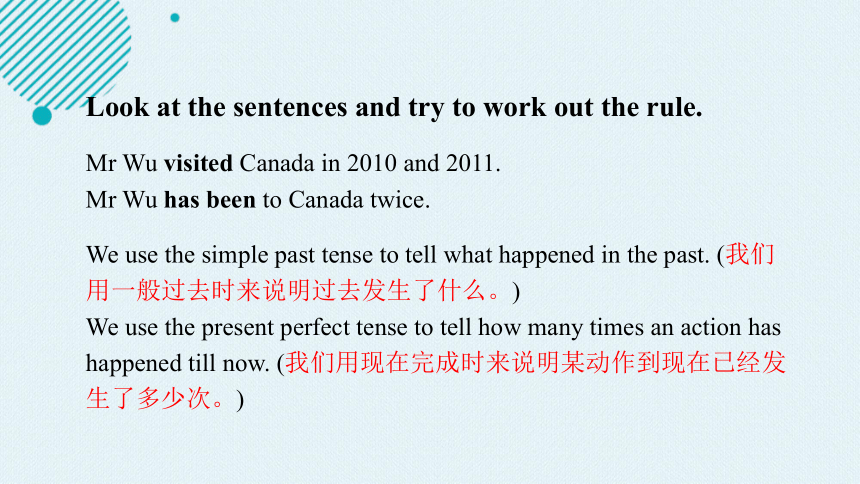
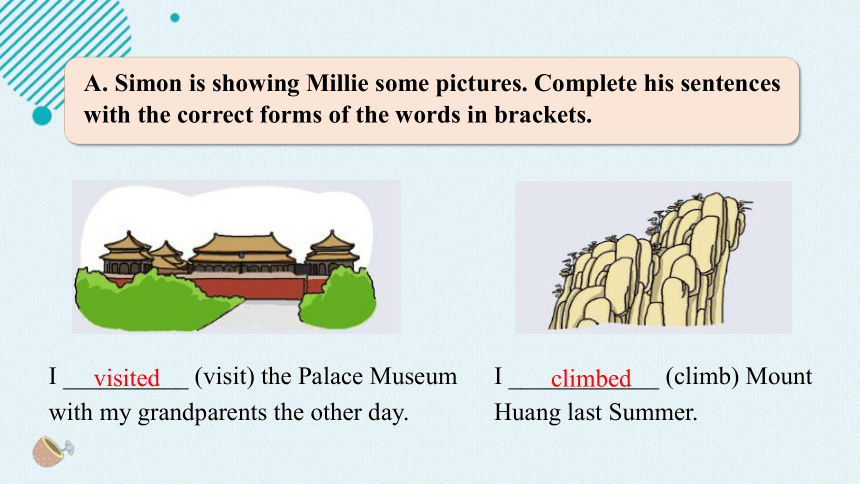
文档简介
(共26张PPT)
Unit 3
Online tours
Period 3
Grammar
1.学习目标
3.重点探究
2.自主学习
学习导航
5.当堂检测
6.课堂总结
4.拓展提升
新课导入
Free Talk
1. What is the simple past tense
2. What is the present perfect tense
3. Do you know the differences between them
1.能熟悉并正确运用本课时的重点单词和短语。
2.能掌握一般过去时和现在完成时的区别。
学习目标
New words
自主学习
dream
passport
vi. & vt. 做梦,梦想
n. 护照
New phrase
dream of/about
梦想;想像
重点探究
Look at the sentences and try to work out the rule.
We use the simple past tense to tell what happened in the past. (我们用一般过去时来说明过去发生了什么。)
We use the present perfect tense to talk about an action that started in the past and continues to the present. (我们用现在完成时来谈论一个开始于过去并一直持续到现在的动作。)
Daniel went to Beijing two years ago.
Daniel has lived in Beijing for two years.
Look at the sentences and try to work out the rule.
We use the simple past tense to tell what happened in the past. (我们用一般过去时来说明过去发生了什么。)
We use the present perfect tense to talk about the result of an action. When the action happened is not very important. It may have just happened or happened some time ago. (我们用现在完成时来谈论一个动作的结果。这个动作何时发生并不是很重要。也许是刚刚发生,也许是一段时间之前就发生。)
Daniel bought a new computer last month.
Daniel has bought a new computer. (Daniel has a new computer now.)
Look at the sentences and try to work out the rule.
We use the simple past tense to tell what happened in the past. (我们用一般过去时来说明过去发生了什么。)
We use the present perfect tense to tell how many times an action has happened till now. (我们用现在完成时来说明某动作到现在已经发生了多少次。)
Mr Wu visited Canada in 2010 and 2011.
Mr Wu has been to Canada twice.
A. Simon is showing Millie some plete his sentences with the correct forms of the words in brackets.
I __________ (visit) the Palace Museum with my grandparents the other day.
I ____________ (climb) Mount Huang last Summer.
visited
climbed
_______ you ever ________ (try) the famous Tianjin Baozi
Have tried
I am happy that I ___________
(learn) to swim.
have learnt
B. Mr Wu is asking the students to make sentences with the correct tenses. Help them complete the sentences with the correct forms of the words in brackets.
2. I __________ (write) an email to my friend yesterday.
Daniel _________________ (write / already) two emails.
1. I ________________ (finish / just) my homework.
Millie __________ (finish) her homework 20 minutes ago.
has already written
have just finished
wrote
finished
4. I __________ (live) in Sunshine Town since I was born.
Daniel _________ (live) in Nanjing in 2007.
3. I _________ (be) in Hainan last week.
Some of our classmates _____________ (not be) to Hainan yet.
was
lived
have lived
haven not been
C. Millie has never been to Nanjing. She is asking Simon about the city. Complete their conversation with the correct forms of the words in brackets.
Millie: (1)___________________ (you/be/ever) to Nanjing
Simon: Yes. I (2)____________ (be) there three times.
Millie: When (3)____________ (you/go) there last
Simon: Last summer. I (4)_________ (spend) a week there.
Millie: (5)____________ (you/like) it
Simon: Oh yes. I (6)________ (have) a great time there. I
(7)_________ (visit) many places of interest and
(8)________ (eat) lots of local food.
Millie: Lucky you! I (9)_______________ (be/never) there.
Have you ever been
have been
did you go
spent
had
visited
ate
have never been
Did you like
D. Millie is writing about the USA in her diary. Complete her diary entry with the correct forms of the verbs in the box.
Saturday, 15 March
Have you ever dreamt of travelling around the world without a passport Yes, you can realize your dream by taking an online tour. Yesterday Daniel (1)_____________ me an online tour of the USA. I (2)___________ never ______________ so many wonderful pictures before.
Last week, I (3)______________ a book about the places of interest in the USA. I (4)______________ 20 pages already. It's really interesting. My dad (5)___________ just _____________ from the USA, but I (6) ___________ never _____________ there. I hope I can visit the USA some day.
showed
have
have
bought
have read
has
returned
seen
been
be buy read return see show
拓展提升
Language Points
1. I visited the Palace Museum with my grandparents the other day. 前几天我和爷爷奶奶参观了故宫。
the other day 相当于a few days ago, 意为“几天前、某天、那天、不久前”,句中用一般过去时。
e.g. I chatted with him the other day.
前几天我和他聊天了。
2. Have you ever dreamt of travelling around the world without a passport 你曾经梦想没有护照周游世界吗?
dream vi.& vt. 做梦,梦想
dream about/of 想象;梦想
e.g. I dreamt (that) I got the job.
我梦见自己得到了那份工作
I dreamt about you last night.
我昨晚梦见你了。
She dreams of running her own business.
她梦想自己开公司。
3. I hope I can visit the USA some day.
我希望有一天我能参观美国。
some day指将来“总有一天、有朝一日、(日后)某一天”,谓语动词用一般将来时。
e.g. Some day he'll be famous.
总有一天他会成名的。
一般过去时和现在完成时的区别
一般过去时和现在完成时都可以表示过去发生的动作,但是在具体的语境中,这两种时态有明显的区别。
一般过去时表示过去某个时间发生的事情或存在的状态,说话的侧重点在陈述过去发生的事情或状态。如
I went to Beijing last month. 我上个月去过北京。
Tom was in China in 2008. 2008年汤姆在中国。
现在完成时表示到说话时为止已经发生或完成(不一定结束)的动作或状态,强调造成的结果对现在产生的影响。如:
I have bought a new mobile phone.
我买了一部新手机(言下之意:我有新手机用了。)
I have been to London many times.
我去过伦敦很多次。(言下之意:我对伦敦较熟悉。)
注意:一般过去时通常与表示过去的时间状语连用。如:yesterday、last week、two years ago、just now、in 2008等。
现在完成时则通常和频度副词或表示一段时间的状语连用。如:many times、never、these days、this week、since ... 、for ... 等。
Simple past tense Present perfect tense
构成 did have/has done
时间状语 yesterday, in 1980, last week, … ago, just now, the other day等 for, since, ever, never, just, yet, recently, before, 次数, in the past years, over the years, so far等
语境 表示过去某时发生的动作或单纯叙述过去的事情,强调动作 持续到现在的动作或状态;强调过去的事情对现在的影响;到目前为止,动作发生的次数
1. They _______ (build) a school in the village in 2008.
2. _________ you ________ (find) your watch yet
3. Mary________ (lose) her pen. ________ you _______ (see)
it here and there
4. —Are you thirsty
—No, I _________just _________ (have) some orange.
5. The old man _________ last year. He has _______ _______
for a year. (die)
当堂检测
一、用动词的适当形式填空。
built
Have found
lost Have seen
have had
died been dead
二、根据汉语意思完成下列句子。
1. 三年前他养了只猫做宠物。
He _________ a cat as pet three years ago.
这只宠物猫他养了三年了。
He _________ the pet cat for three years.
2. 我上个星期去参观了那个新动物园。
I ____________ that new zoo last week.
我已经参观过那个新动物园了。
I ____________ that new zoo.
3. 我上周看过这部电影。
I ____________ this movie last week.
我已经看过这部电影很多次。
I ____________ this movie many times.
kept
has kept
visited
have visited
saw
have seen
课堂总结
重点单词和和短语:
dream, passport, dream of/about
一般过去时和现在完成时时的区别:
一般过去时表示过去某个时间发生的事情或存在的状态,说话的侧重点在于陈述________的事情或状态;
现在完成时表示到说话时为止_______发生或完成(不一定结束)的动作或状态,强调造成的结果对______造成的影响。
Unit 3
Period 3
过去
已经
现在
Unit 3
Online tours
Period 3
Grammar
1.学习目标
3.重点探究
2.自主学习
学习导航
5.当堂检测
6.课堂总结
4.拓展提升
新课导入
Free Talk
1. What is the simple past tense
2. What is the present perfect tense
3. Do you know the differences between them
1.能熟悉并正确运用本课时的重点单词和短语。
2.能掌握一般过去时和现在完成时的区别。
学习目标
New words
自主学习
dream
passport
vi. & vt. 做梦,梦想
n. 护照
New phrase
dream of/about
梦想;想像
重点探究
Look at the sentences and try to work out the rule.
We use the simple past tense to tell what happened in the past. (我们用一般过去时来说明过去发生了什么。)
We use the present perfect tense to talk about an action that started in the past and continues to the present. (我们用现在完成时来谈论一个开始于过去并一直持续到现在的动作。)
Daniel went to Beijing two years ago.
Daniel has lived in Beijing for two years.
Look at the sentences and try to work out the rule.
We use the simple past tense to tell what happened in the past. (我们用一般过去时来说明过去发生了什么。)
We use the present perfect tense to talk about the result of an action. When the action happened is not very important. It may have just happened or happened some time ago. (我们用现在完成时来谈论一个动作的结果。这个动作何时发生并不是很重要。也许是刚刚发生,也许是一段时间之前就发生。)
Daniel bought a new computer last month.
Daniel has bought a new computer. (Daniel has a new computer now.)
Look at the sentences and try to work out the rule.
We use the simple past tense to tell what happened in the past. (我们用一般过去时来说明过去发生了什么。)
We use the present perfect tense to tell how many times an action has happened till now. (我们用现在完成时来说明某动作到现在已经发生了多少次。)
Mr Wu visited Canada in 2010 and 2011.
Mr Wu has been to Canada twice.
A. Simon is showing Millie some plete his sentences with the correct forms of the words in brackets.
I __________ (visit) the Palace Museum with my grandparents the other day.
I ____________ (climb) Mount Huang last Summer.
visited
climbed
_______ you ever ________ (try) the famous Tianjin Baozi
Have tried
I am happy that I ___________
(learn) to swim.
have learnt
B. Mr Wu is asking the students to make sentences with the correct tenses. Help them complete the sentences with the correct forms of the words in brackets.
2. I __________ (write) an email to my friend yesterday.
Daniel _________________ (write / already) two emails.
1. I ________________ (finish / just) my homework.
Millie __________ (finish) her homework 20 minutes ago.
has already written
have just finished
wrote
finished
4. I __________ (live) in Sunshine Town since I was born.
Daniel _________ (live) in Nanjing in 2007.
3. I _________ (be) in Hainan last week.
Some of our classmates _____________ (not be) to Hainan yet.
was
lived
have lived
haven not been
C. Millie has never been to Nanjing. She is asking Simon about the city. Complete their conversation with the correct forms of the words in brackets.
Millie: (1)___________________ (you/be/ever) to Nanjing
Simon: Yes. I (2)____________ (be) there three times.
Millie: When (3)____________ (you/go) there last
Simon: Last summer. I (4)_________ (spend) a week there.
Millie: (5)____________ (you/like) it
Simon: Oh yes. I (6)________ (have) a great time there. I
(7)_________ (visit) many places of interest and
(8)________ (eat) lots of local food.
Millie: Lucky you! I (9)_______________ (be/never) there.
Have you ever been
have been
did you go
spent
had
visited
ate
have never been
Did you like
D. Millie is writing about the USA in her diary. Complete her diary entry with the correct forms of the verbs in the box.
Saturday, 15 March
Have you ever dreamt of travelling around the world without a passport Yes, you can realize your dream by taking an online tour. Yesterday Daniel (1)_____________ me an online tour of the USA. I (2)___________ never ______________ so many wonderful pictures before.
Last week, I (3)______________ a book about the places of interest in the USA. I (4)______________ 20 pages already. It's really interesting. My dad (5)___________ just _____________ from the USA, but I (6) ___________ never _____________ there. I hope I can visit the USA some day.
showed
have
have
bought
have read
has
returned
seen
been
be buy read return see show
拓展提升
Language Points
1. I visited the Palace Museum with my grandparents the other day. 前几天我和爷爷奶奶参观了故宫。
the other day 相当于a few days ago, 意为“几天前、某天、那天、不久前”,句中用一般过去时。
e.g. I chatted with him the other day.
前几天我和他聊天了。
2. Have you ever dreamt of travelling around the world without a passport 你曾经梦想没有护照周游世界吗?
dream vi.& vt. 做梦,梦想
dream about/of 想象;梦想
e.g. I dreamt (that) I got the job.
我梦见自己得到了那份工作
I dreamt about you last night.
我昨晚梦见你了。
She dreams of running her own business.
她梦想自己开公司。
3. I hope I can visit the USA some day.
我希望有一天我能参观美国。
some day指将来“总有一天、有朝一日、(日后)某一天”,谓语动词用一般将来时。
e.g. Some day he'll be famous.
总有一天他会成名的。
一般过去时和现在完成时的区别
一般过去时和现在完成时都可以表示过去发生的动作,但是在具体的语境中,这两种时态有明显的区别。
一般过去时表示过去某个时间发生的事情或存在的状态,说话的侧重点在陈述过去发生的事情或状态。如
I went to Beijing last month. 我上个月去过北京。
Tom was in China in 2008. 2008年汤姆在中国。
现在完成时表示到说话时为止已经发生或完成(不一定结束)的动作或状态,强调造成的结果对现在产生的影响。如:
I have bought a new mobile phone.
我买了一部新手机(言下之意:我有新手机用了。)
I have been to London many times.
我去过伦敦很多次。(言下之意:我对伦敦较熟悉。)
注意:一般过去时通常与表示过去的时间状语连用。如:yesterday、last week、two years ago、just now、in 2008等。
现在完成时则通常和频度副词或表示一段时间的状语连用。如:many times、never、these days、this week、since ... 、for ... 等。
Simple past tense Present perfect tense
构成 did have/has done
时间状语 yesterday, in 1980, last week, … ago, just now, the other day等 for, since, ever, never, just, yet, recently, before, 次数, in the past years, over the years, so far等
语境 表示过去某时发生的动作或单纯叙述过去的事情,强调动作 持续到现在的动作或状态;强调过去的事情对现在的影响;到目前为止,动作发生的次数
1. They _______ (build) a school in the village in 2008.
2. _________ you ________ (find) your watch yet
3. Mary________ (lose) her pen. ________ you _______ (see)
it here and there
4. —Are you thirsty
—No, I _________just _________ (have) some orange.
5. The old man _________ last year. He has _______ _______
for a year. (die)
当堂检测
一、用动词的适当形式填空。
built
Have found
lost Have seen
have had
died been dead
二、根据汉语意思完成下列句子。
1. 三年前他养了只猫做宠物。
He _________ a cat as pet three years ago.
这只宠物猫他养了三年了。
He _________ the pet cat for three years.
2. 我上个星期去参观了那个新动物园。
I ____________ that new zoo last week.
我已经参观过那个新动物园了。
I ____________ that new zoo.
3. 我上周看过这部电影。
I ____________ this movie last week.
我已经看过这部电影很多次。
I ____________ this movie many times.
kept
has kept
visited
have visited
saw
have seen
课堂总结
重点单词和和短语:
dream, passport, dream of/about
一般过去时和现在完成时时的区别:
一般过去时表示过去某个时间发生的事情或存在的状态,说话的侧重点在于陈述________的事情或状态;
现在完成时表示到说话时为止_______发生或完成(不一定结束)的动作或状态,强调造成的结果对______造成的影响。
Unit 3
Period 3
过去
已经
现在
